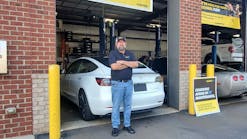It isn't just the cars that have become more complex in recent years, the way that a shop manages all of the crucial information has also evolved. Three-ring binders and filing cabinets filled with forms is largely a thing of the past.
Today, the point-of-sale (POS) system is the connective link within any quick maintenance shop. It is the database that links customer information with service history, upcoming maintenance notes and inventory. With all of this data under the hood, any thought of updates coming from a software company or even upgrades to a new system can sound as daunting as the transition to servicing hybrids and electric vehicles.
Seamless (In Theory)
POS software updates are meant to be seamless and apply fixes to bugs, security issues and small enhancements to the software. An upgrade is typically a much larger jump, which can include a new interface, major feature additions and even new access platforms such as mobile.
In most cases upgrading and adding POS platforms to your shop should not cause problems, and working with the provider's representatives can smooth any hiccups. As with all software, staying on top of these updates and upgrades is critical.
Upgrading an Old System
It is easy to stay with the same system, until that POS software becomes a legacy system and no longer supported by the company. In those cases shops are left with the decision to upgrade with the same company or look for a new provider.
Mike's In Out Oil Change in Alexandria, Minnesota, had used the same POS software until recently when the provider stopped supporting its old system.
"The software and package we were using came to an end of its service life," says Jeff Perreault, owner of Mike's In Out Oil Change. "I usually get scared of loss of data, but everything went smoothly. No hiccups or our people having to relearn the system."
The changeover took place over one late night with workers from the shop as well as the POS software company setting up any new equipment and installing software. The shop kept the same keyboards and screens, but the 12-year-old hard drives needed to be switched out. Still, he says it went seamlessly, and the result is added feature functionality.
"It tracks my labor costs live, cost of supplies, history," Perreault says. "I can go back 10 years and compare this March to that March. It's amazing how accurate it is."
Cons of the Cloud
Most systems in the current market maintain a database on the cloud rather than locally in the shop.
Some might see this as a feature, but Joe Afi doesn’t see it that way. Afi runs Mack Lube in Grosse Pointe, Michigan, which he bought in 2016. Right away, he changed to a new POS. In the time since he acquired Mack Lube, the POS provider was acquired by the same company that he transitioned away from.
The biggest complaint Afi has is that the POS keeps all data in the cloud while he wants the data to be stored locally—even if it is maintained in both locations—so that he can access the POS if there is a power or Internet outage. A backup generator keeps the shop running, but doesn't always allow it to connect to the cloud.
"We've had two communication outages," says Afi. "We were without Internet for over a day. In that downtime if I didn't have a local database I wouldn't be able to service my customers."
The system also has some pain points. Afi finds it time consuming to add new products to the database and import and export data to other Excel-compatible systems such as QuickBooks.
"If I get a new product in, with the new catalog I still have to enter every single item," Afi says.
Staying with a System
Even if you’re having trouble with your modern POS system, don’t be so quick to ditch the vendor. In the fast-paced oil and lube business it can be easier, at least in the short term, to stay with the same POS. Regular updates provide new enhancements and allow the shop to keep up with new demands.
Bass Quick Lube in Clinton Township, Michigan, has stayed with the same system for years. Owner Bass Bazzi says that they’ve had success upgrading the existing system rather than springing for new.
The shop accesses the POS through computer terminals, though they do use an app in some cases to work on the system.
One common challenge with POS systems that constantly update is a lack of training. Bazzi says he looks online to get help or click around to explore the system.
"The company itself doesn't train us," explains Bazzi. "They just got us through it with online tips."
Perreault had the same experience. He says that they’ve found shortcuts through their own research, finding new tips either on purpose or by happy accident.
Upgrading Benefits
When upgrades are necessary, it might be useful to bridge the old and new systems during the transition. At Mack Lube, employees used the old system while learning the new so they could get used to the change while minimizing errors.
"I was having people use the old system and then the new so they had time to get used to the new system while still working [with the system they were familiar with]," Afi says.
The upgrade process may take time to install and to learn, though providers do their best to ensure a smooth transition. The benefits will be immediate for most, though more functionality takes some time.
"It's faster, way faster," says Perreault, who saw the difference immediately after the system upgrade in early summer 2020.
Sometimes it takes more time for the benefits to be realized.
"Four years ago I really didn't like it because I didn't know what it could do," Perreault says. "This thing's got everything built right in."
After spending time with the POS system, Perreault discovered new features that would benefit the shop. It just might take a little extra effort to find it.
"All of a sudden you find something. This thing's got a time clock in it, it tracks my labor. It has amazing cost control built right into it that we didn't even know we had."






